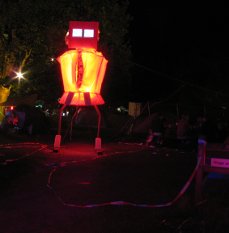 I just turned away from the lock-picking talk, as the tent was absolutely packed (me being 5 minutes late). I don’t know how many people fit in these convention tents, hundreds, perhaps thousands, but that is the amount of people that after tonight may know how to break every lock you own.
I just turned away from the lock-picking talk, as the tent was absolutely packed (me being 5 minutes late). I don’t know how many people fit in these convention tents, hundreds, perhaps thousands, but that is the amount of people that after tonight may know how to break every lock you own.
Earlier today I was at the talk with possibly the smallest amount of listeners of this 4-day exercise, you might even say the attendants resembled Cantor Dust. OK, lousy statistical jokes aside, this talk was by statistician Richard Gill of the University of Leiden and dealt with the Lucia de Berk case.
I had heard of the case before. In 2001, a nurse from The Hague was accused of having murdered dozens of patients, and the strange thing was that most of her guilt was determined by statistics: she had been near the victims at the time of their deaths, and although a direct link with the accused in the form of a confession or evidence could not be established, the court found that the statistical likelihood of her being near all these victims at the time of death was so minute, she must have done it.
At the time I thought this reasoning seemed silly, but I have learned early on in life never to argue with statisticians. So imagine my surprise: here was a statician who argued that the court’s reason had indeed been extremely silly, and that an innocent woman had gone to jail.
I won’t bore you with repeating the entire lecture: author Maarten ‘t Hart summarized Gill’s position excellently in this article from NRC (Dutch). Gill’s paper on how likely the chance is that a nurse was on active duty during all deaths concludes that one in nine nurses would have gone to jail (PDF).
(more…)





 Jan H. thought he was playing the Silent Hill video game when he shut down the electricity at the Sophia hospital in Zwolle last Queen’s Day.
Jan H. thought he was playing the Silent Hill video game when he shut down the electricity at the Sophia hospital in Zwolle last Queen’s Day.  I just turned away from the lock-picking talk, as the tent was absolutely packed (me being 5 minutes late). I don’t know how many people fit in these convention tents, hundreds, perhaps thousands, but that is the amount of people that after tonight may know how to break every lock you own.
I just turned away from the lock-picking talk, as the tent was absolutely packed (me being 5 minutes late). I don’t know how many people fit in these convention tents, hundreds, perhaps thousands, but that is the amount of people that after tonight may know how to break every lock you own.